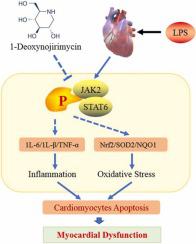Biomedicine & Pharmacotherapy ( IF 6.9 ) Pub Date : 2022-09-13 , DOI: 10.1016/j.biopha.2022.113648 LiQing Jiang 1 , LiYun Zhang 1 , JiaChang Yang 1 , Heng Shi 1 , HanZhao Zhu 1 , MengEn Zhai 1 , LinHe Lu 1 , XiaoWu Wang 1 , Xia Yun Li 1 , ShiQiang Yu 1 , JinCheng Liu 1 , WeiXun Duan 1

|
Cardiac dysfunction caused by sepsis is the predominant reason for death in patients with sepsis. However, the effective drugs for its prevention and the molecular mechanisms remain elusive. 1-Deoxynojirimycin (DNJ), a natural iminopyranose, exhibits various biological properties, such as hypoglycemic, antitumor, antiviral, and anti-inflammatory activities. However, whether DNJ can mediate biological activity resistance in sepsis-induced myocardial injury and the underlying mechanisms are unclear. Janus kinase and signal transducer and activator of transcription (JAK/STAT) signaling is an important pathway for the signal transduction of several key cytokines in the pathogenesis of sepsis, which can transcribe and modulate the host immune response. This study was conducted to confirm whether DNJ mediates oxidative stress, apoptosis, and inflammation in cardiomyocytes, thereby alleviating myocardial injury in sepsis via the JAK2/STAT6 signaling pathway. Septic cardiomyopathy was induced in mice using lipopolysaccharide (LPS), and they were then treated with DNJ. The results showed that DNJ markedly improved sepsis-induced cardiac dysfunction, attenuated reactive oxygen species generation, reduced cardiomyocyte apoptosis, and mitigated inflammation. Mechanistically, increased JAK2/STAT6 phosphorylation was observed in the mouse sepsis models, which decreased significantly after DNJ oral treatment. To further confirm whether DNJ mediates the JAK2/STAT6 pathway, the selective inhibitor fedratinib was used to block the JAK2 signaling pathway in vitro, which enhanced the protective effects of DNJ against the sepsis-induced cardiac damage. Collectively, these findings suggest that DNJ attenuates sepsis-induced myocardial injury by decreasing myocardial oxidative damage, apoptosis, and inflammation via the regulation of the JAK2/STAT6 signaling pathway.
中文翻译:

1-脱氧野尻霉素通过 JAK2/STAT6 信号通路调节氧化应激、细胞凋亡和炎症减轻脓毒性心肌病
脓毒症引起的心功能不全是脓毒症患者死亡的主要原因。然而,预防其的有效药物及其分子机制仍然难以捉摸。1-脱氧野尻霉素 (DNJ) 是一种天然亚氨基吡喃糖,具有多种生物学特性,如降血糖、抗肿瘤、抗病毒和抗炎活性。然而,DNJ是否可以介导脓毒症心肌损伤中的生物活性抵抗,其潜在机制尚不清楚。Janus激酶和信号转导和转录激活因子(JAK/STAT)信号转导是脓毒症发病机制中几种关键细胞因子信号转导的重要途径,可转录和调节宿主免疫反应。本研究旨在确认 DNJ 是否介导氧化应激、细胞凋亡、和心肌细胞炎症,从而通过 JAK2/STAT6 信号通路减轻脓毒症中的心肌损伤。使用脂多糖 (LPS) 在小鼠中诱导感染性心肌病,然后用 DNJ 治疗它们。结果表明,DNJ 显着改善了脓毒症引起的心脏功能障碍,减少了活性氧的产生,减少了心肌细胞的凋亡,并减轻了炎症。机制上,在小鼠脓毒症模型中观察到 JAK2/STAT6 磷酸化增加,在 DNJ 口服治疗后显着降低。为进一步证实DNJ是否介导JAK2/STAT6通路,在体外采用选择性抑制剂fedratinib阻断JAK2信号通路,增强了DNJ对脓毒症所致心脏损伤的保护作用。集体,











































 京公网安备 11010802027423号
京公网安备 11010802027423号